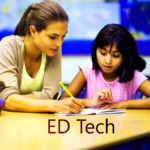Want to know EdTech Trends in 2023? Education Technology, commonly known as EdTech, has emerged as a powerful force in transforming the landscape of education. By leveraging technology, EdTech aims to enhance teaching and learning experiences, improve educational outcomes, and bridge gaps in access to quality education. In this article, we will explore the scope of EdTech and how it is revolutionizing education.
EdTech encompasses a wide range of technologies, tools, and digital resources designed to enhance the educational experience. It encompasses everything from interactive learning platforms and educational apps to virtual reality simulations and adaptive learning systems. The scope of EdTech is vast, with the primary goal of leveraging technology to improve teaching and learning outcomes.
Read More: 5 Best Role of EdTech in Preparing Students for the Future Job Market
Explore the Contents
- 1 The Scope of EdTech
- 1.1 Enhancing Teaching and Learning
- 1.2 Promoting Personalized Learning
- 1.3 Addressing Accessibility and Inclusivity
- 1.4 Enabling Remote and Online Learning
- 1.5 Fostering Collaboration and Engagement
- 1.6 Enhancing Assessment and Feedback
- 1.7 Facilitating Professional Development
- 1.8 Supporting Data-Driven Decision Making
- 2 Top 10 EdTech Trends
- 3 Conclusion
- 4 FAQs
The Scope of EdTech

Enhancing Teaching and Learning
One of the primary objectives of EdTech is to enhance the effectiveness of teaching and learning. Technology can provide educators with innovative tools and resources to create engaging and interactive lessons, facilitate content delivery, and promote active student participation. It enables the integration of multimedia elements, such as videos, animations, and simulations, to enhance understanding and retention of complex concepts.
Promoting Personalized Learning
EdTech has the potential to revolutionize the way education is delivered by promoting personalized learning experiences. Adaptive learning systems can analyze individual student data and provide tailored content, assessments, and feedback based on their unique strengths and weaknesses. This customization allows students to learn at their own pace, follow personalized learning paths, and engage with content that matches their learning styles and preferences.
Addressing Accessibility and Inclusivity
Technology in education has the power to address accessibility and inclusivity challenges. With the help of assistive technologies, students with disabilities can overcome barriers and actively participate in the learning process. Digital resources can be designed to accommodate diverse learning needs, ensuring that educational content is accessible to all students, regardless of their physical or cognitive abilities.
Enabling Remote and Online Learning
EdTech has gained significant importance, especially in the context of remote and online learning. With the advancement of technology, learners can access educational resources and participate in virtual classrooms from anywhere in the world. Online learning platforms, video conferencing tools, and collaborative online spaces enable seamless communication and interaction between students and educators, fostering a sense of community and enabling continuous learning outside traditional classrooms.
Fostering Collaboration and Engagement
Technology plays a crucial role in fostering collaboration and engagement among students. Virtual collaboration tools, discussion forums, and online project platforms facilitate peer-to-peer interaction, teamwork, and knowledge sharing. Gamified learning experiences, interactive quizzes, and educational games make the learning process more enjoyable and engaging, increasing student motivation and participation.
Enhancing Assessment and Feedback
EdTech offers innovative assessment methods and tools that go beyond traditional exams and tests. Technology-enabled assessments can provide instant feedback to students, allowing them to identify areas of improvement and make necessary adjustments in their learning approach. Automated grading systems streamline the assessment process for educators, saving time and enabling more timely feedback to students.
Facilitating Professional Development
EdTech is not only beneficial for students but also for educators. Professional development programs and resources delivered through online platforms and webinars enable teachers to enhance their teaching skills, explore new pedagogical approaches, and stay updated with the latest educational trends. EdTech facilitates continuous professional growth, supporting educators in delivering high-quality instruction.
Supporting Data-Driven Decision Making
Data analytics and educational data mining have become integral components of EdTech. By analyzing large datasets, educators and administrators can gain valuable insights into student performance, identify trends and patterns, and make data-driven decisions to improve educational outcomes. Data-driven approaches help in identifying areas for improvement, implementing targeted interventions, and evaluating the effectiveness of educational programs.
Read More: The Ethics of Data Collection in EdTech: Balancing Privacy and Progress
Top 10 EdTech Trends

Education Technology, or EdTech, has revolutionized the way we learn and teach. With advancements in technology, the education sector is constantly evolving, adopting new tools and techniques to enhance the learning experience.
The rapid advancement of technology has brought about significant changes in the education sector. EdTech has opened up new opportunities for both educators and learners, enabling personalized learning experiences and enhancing overall educational outcomes. Let’s delve into the top 10 EdTech trends that are expected to shape the educational landscape in 2023.
Artificial Intelligence in Education
Artificial Intelligence (AI) has emerged as a powerful tool in education. AI-powered systems can analyze large amounts of data and provide personalized feedback and recommendations to students. Intelligent tutoring systems, chatbots, and automated grading systems are some of the applications of AI in education that are gaining traction. In 2023, we can expect to see further integration of AI into various aspects of the education process.
Gamification of Learning
Gamification involves the use of game elements and mechanics in non-game contexts, such as education. It enhances student engagement and motivation by turning learning into an interactive and enjoyable experience. Gamified learning platforms, educational games, and simulations are becoming increasingly popular. In 2023, we can anticipate the expansion of gamification in education, making learning more immersive and interactive.
Virtual and Augmented Reality
Virtual Reality (VR) and Augmented Reality (AR) technologies offer unique opportunities for immersive and experiential learning. VR allows students to explore virtual environments, while AR overlays digital content onto the real world. These technologies are particularly valuable in fields such as science, engineering, and medicine, where hands-on experiences are crucial. In 2023, we can expect wider adoption of VR and AR in classrooms, providing students with enhanced learning experiences.
Adaptive Learning Systems
Adaptive learning systems leverage data and analytics to customize learning experiences based on individual needs and progress. These systems use algorithms to deliver personalized content, assessments, and feedback, catering to each student’s unique learning pace and style. In 2023, we can anticipate the expansion of adaptive learning systems, enabling educators to deliver tailored instruction effectively.
Data Analytics in Education
Data analytics plays a vital role in informing educational decision-making. By analyzing large datasets, educators can gain insights into student performance, identify areas for improvement, and develop data-driven strategies. In 2023, data analytics will continue to be a significant trend in EdTech, empowering educators with actionable information to improve learning outcomes.
Mobile Learning
Mobile devices have become an integral part of our daily lives, and education is no exception. Mobile learning allows students to access educational content anytime, anywhere, using their smartphones or tablets. Mobile apps, interactive eBooks, and learning management systems optimized for mobile devices are becoming increasingly popular. In 2023, we can expect further integration of mobile learning into the educational ecosystem.
Personalized Learning Paths
Personalized learning focuses on tailoring educational experiences to meet the unique needs and interests of individual learners. It emphasizes self-paced learning, student choice, and targeted instruction. Adaptive learning technologies, competency-based education, and learning analytics contribute to creating personalized learning paths. In 2023, personalized learning will continue to gain momentum, empowering students to take ownership of their learning journey.
Blockchain in Education
Blockchain technology, known for its transparency and security, is finding its way into the education sector. Blockchain can be utilized for secure credentialing, verifying academic records, and facilitating decentralized learning platforms. By leveraging blockchain, educational institutions can enhance data security and streamline administrative processes. In 2023, we can anticipate increased exploration of blockchain applications in education.
Internet of Things (IoT) in Education
The Internet of Things (IoT) refers to the network of interconnected devices that collect and exchange data. In education, IoT can be used to create smart classrooms, where devices such as interactive whiteboards, wearable devices, and sensors facilitate seamless communication and data sharing. IoT-enabled classrooms can enhance collaboration, enable personalized learning, and provide real-time feedback. In 2023, we can expect the further integration of IoT in education, transforming traditional classrooms into dynamic learning environments.
Conclusion
As we look ahead to 2023, the EdTech landscape is poised for significant transformation. The top 10 EdTech trends we explored in this article—Artificial Intelligence, Gamification, Virtual and Augmented Reality, Adaptive Learning Systems, Data Analytics, Mobile Learning, Personalized Learning Paths, Blockchain, and IoT—will shape the future of education. By embracing these trends, educators and learners can unlock new possibilities and create enriching educational experiences.
FAQs
Q1: How can Artificial Intelligence improve education?
Artificial Intelligence can enhance education by providing personalized feedback, intelligent tutoring, and automated grading systems. It analyzes data to deliver tailored learning experiences and support individual student needs.
Q2: What is gamified learning?
Gamified learning refers to the use of game elements and mechanics in educational contexts. It makes learning interactive and engaging, promoting student motivation and participation.
Q3: How does Virtual Reality benefit education?
Virtual Reality offers immersive experiences, allowing students to explore virtual environments and gain hands-on learning opportunities. It enhances understanding and retention of complex concepts.
Q4: What is personalized learning?
Personalized learning focuses on tailoring educational experiences to individual student needs and interests. It allows students to learn at their own pace and engage with content that matches their learning style.
Q5: How can blockchain be used in education?
Blockchain can secure credentials, verify academic records, and create decentralized learning platforms. It enhances data security and simplifies administrative processes in the education sector.



